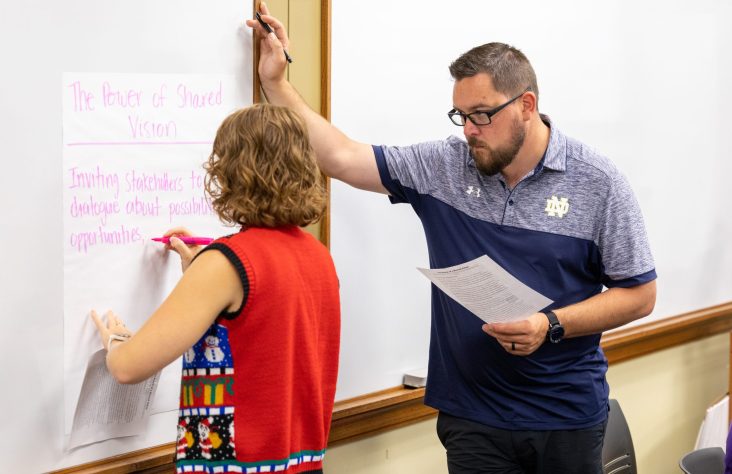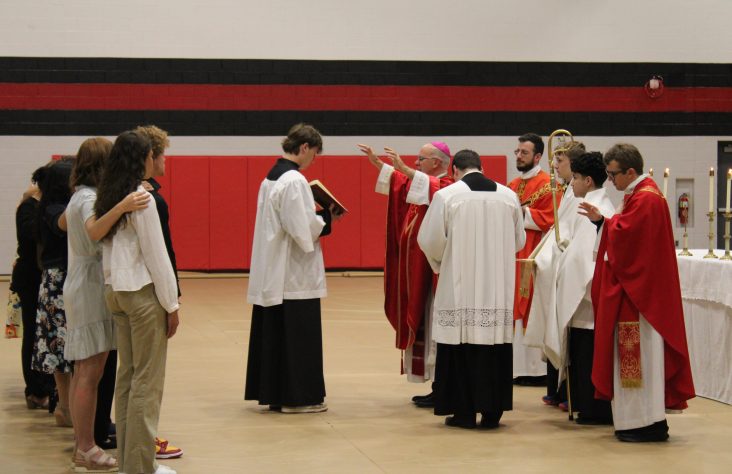October 8, 2009 // Uncategorized
Diocesan policies address how to handle H1N1 flu in churches, schools
WASHINGTON (CNS) — Starting with Masses the weekend of Oct. 17-18 in the Diocese of Altoona-Johnstown, Pa., Communion will not be offered from the cup during flu season, said Bishop Joseph V. Adamec of Altoona-Johnstown in an Oct. 4 document titled “Holy Communion Directives.”
Further, “any sign of peace is to be without bodily contact. Therefore, handshaking and kissing as signs of peace are to be suspended,” Bishop Adamec said. “Nodding is suggested.”
While “the most sanitary way of receiving holy Communion is in the hand,” he added, “reception on the tongue may not be denied.”
Bishop Adamec was among bishops and other church leaders in U.S. dioceses announcing measures to combat a potential outbreak of the H1N1 flu virus, popularly called swine flu, during the coming months.
In Altoona-Johnstown the restrictions will remain in effect until withdrawn by the bishop, who along with the other Latin-rite bishops of Pennsylvania agreed to issue directives for Communion during the flu season, though each bishop issued directives specific to his diocese.
Bishop Adamec said in his diocese all ministers distributing Communion “are to wash or sanitize their hands just prior to doing so,” and the water in holy water fonts is to be changed regularly. Catholics are excused from the obligation to attend Sunday Mass when battling the flu.
In Arkansas in response to reports about the flu, Bishop Anthony B. Taylor of Little Rock said in a Sept. 22 statement that people should already be taking precautions to avoid spreading H1N1 like they do for any flu.
“I do not anticipate the need for large-scale liturgical adaptations to practices such as the distribution of the holy Eucharist under both species, the exchange of the sign of peace or the availability of holy water in the holy water font,” he said.
“It is already our practice that those who feel ill should forgo receiving the precious blood, and fearful individuals are in any event not obligated to receive from the cup, shake hands or touch the holy water.”
“Because of the danger of the influenza A virus (H1N1) and our inability to predict what will happen, it would be prudent not to join hands at the Our Father,” Bishop Arthur J. Serratelli of Paterson, N.J., said in a statement to diocesan Catholics.
“Please know that it is not necessary to shake hands during the sign of peace at Mass,” he said. “A simple bow and greeting would suffice. Please remember that any one who receives the body of Christ receives the body, blood, soul and divinity of Christ and is in no way deprived by not receiving the precious blood from the cup.”
The Office of Health Ministry in the Diocese of Wheeling-Charleston, W.Va., distributed a memorandum to all parishes with general and liturgical guidelines to prevent the spread of influenza or H1N1.
They address a number of issues, including the celebration of Mass in the event of the priest being ill and hygiene measures for priests, deacons and eucharistic ministers.
The memo addresses the sign of peace, noting, “There is no single gesture required for this sign.” It recommends that parishioners are “considerate of sensitivities of others” and “may offer an embrace, place a hand on another’s shoulder, offer a simple bow or shake hands when comfortable.” The memorandum also reminds parishioners to stay at home if ill.
The Catholic Schools Office in the Diocese of Tucson, Ariz., issued a “battle plan” to combat H1N1. If the flu outbreak is severe, people with flulike symptoms should stay home “for at least seven days,” the statement said, “even if they have no more symptoms … they should stay home until 24 hours after they have no symptoms.”
“Reactive” dismissals will be appropriate “when schools are not able to maintain normal functioning,” while “pre-emptive” dismissals could occur “if the flu starts to cause severe disease in a significantly larger proportion of those affected,” the statement said. School closures, it added, “will be at the discretion of the local health departments.”
After six swine flu cases were confirmed at five different Catholic schools in the Diocese of Nashville, Tenn., by early September, “we’re asking that if they have a confirmed case they stay home seven days” before they return to school, said diocesan school superintendent Therese Williams.
“The key we’re hearing from the Health Department is the child should be fever-free for 24 hours without assistance of medication before returning to school and should be home at least seven days,” Williams said.
Since reports of a potential swine flu pandemic emerged, schools have been following Tennessee state guidelines in cleaning and disinfecting all areas of the school that are used by multiple children, such as desktops, computer keyboards, lunch tables, water fountains and door knobs, Williams said. “Children are asked to clean their hands throughout the day,” Williams added.
Although Catholic schools in the Archdiocese of St. Paul and Minneapolis have been ordered to cease offering consecrated wine in shared chalices at all school Masses, parishes have not been given any mandatory restrictions.
One Catholic school in the archdiocese was among the first 30 in Minnesota to meet the state threshold for “significant” flulike symptoms: 5 percent of the total student population, or three students in an elementary school classroom. The threshold applies to swine flu or other influenza strains.
When Hill-Murray School in Maplewood, Minn., reached the threshold Sept. 15, school officials contacted parents via e-mail and newly created Facebook and Twitter accounts with the news.
The archdiocese said that, just as all schools have an emergency plan in place for a pandemic emergency, so should parish religious educators be prepared with substitute catechists, a communication plan and alternatives to delivering religious education content.
In the Diocese of Davenport, Iowa, after more than a quarter of students at a local high school stayed home with flulike symptoms Sept. 29, St. Alphonsus Parish became the first parish in the diocese to move to the second step of the diocese’s policy for influenza preparation.
In accordance with the policy, during Masses Oct. 3-4 the Mount Pleasant parish did not distribute Communion in the form of wine or on the tongue, and parishioners did not shake hands during the sign of peace or hold hands while praying the Lord’s Prayer. Hand sanitizers were placed throughout the church.
“It’s better to be proactive than reactive,” said Father Joseph P.V. Phung, pastor.
The Diocese of Metuchen, N.J., distributed a “pandemic management plan” to Catholic school principals in September.
In addition, the diocese was helping coordinate voluntary inoculations for students at dates and times to be determined in the fall, said Donna Kanowitz, assistant superintendent of diocesan schools. The vaccine would be administered by local health departments at no charge. A student would need parental permission to receive the vaccine, she said.
The diocese planned to try to schedule inoculations after school or at night so parents can be present with their child, she said.
The pandemic management plan is an addendum to each school’s crisis management plan.
In the event of a school closing, schools would communicate with families with a Web site called PowerSchool to provide students with information such as lesson plans and grades, Kanowitz said. The diocese wants teachers to continue to interact with students during a closing, she added. E-mails and, if necessary, phone calls, would also be used, according to Kanowitz.
“One of the things we have to determine is how many children don’t have access to the Internet in their home. There might be some and we have to find out how to reach them,” she said.
– – –
Contributing to this story were Chris Donahue in Piscataway, N.J., Malea Hargett in Little Rock, D.F. Kratzer in Wheeling, Pat Norby in Maplewood, Rich Sokerka in Paterson, Andy Telli in Nashville, Bern Zovistoski in Tucson and Celine Klosterman in Davenport.
The best news. Delivered to your inbox.
Subscribe to our mailing list today.





